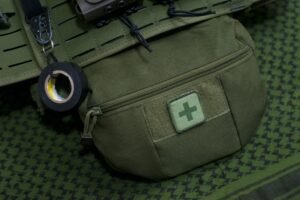
Attention, troops! It’s time to trade in your combat boots for some comfy hospital clogs. We’re about to embark on a mission to explore how military veterans can transition into the world of allied health professionals. So, stand at ease and let’s march into the exciting realm of allied health care!
Operation Career Change: Your New Tour of Duty
You’ve served your country with honour, but now it’s time to serve in a different capacity. The transition from military to civilian life can be as challenging as a 10-mile ruck march with a full pack. But fear not, soldier! The allied healthcare profession might just be your perfect landing zone.
Allied Health Jobs: Where Military Skills Meet Medical Missions
Think your military experience doesn’t translate to the medical field? Think again, recruit! Let’s decode how your military prowess can be your secret weapon in various allied health jobs:
-
Emergency Medical Technician:
Your ability to stay cool under pressure makes you perfect for this role. It’s like being in the field, but your enemies are injuries and illnesses, not opposing forces.
-
Radiologic Technologist:
Attention to detail and following precise protocols? That’s your bread and butter! It’s like operating high-tech military equipment, but instead of detecting enemies, you’re detecting health issues.
-
Physical Therapy Assistant:
Your experience in physical training and rehabilitation after injuries is invaluable here. It’s like being a drill sergeant, but your goal is to build people up, not break them down.
-
Medical Laboratory Technician:
Your discipline and meticulousness make you a perfect fit. It’s like being an intelligence analyst, but instead of decoding enemy messages, you’re decoding bodily fluids.
-
Healthcare Administrator:
Your leadership skills and ability to manage chaos are exactly what’s needed. It’s like running a military operation, but your troops are medical staff and your mission is patient care.
Allied Health Care: Where Every Day is a New Mission
These roles aren’t just jobs; they’re opportunities to continue serving and making a difference. It’s a whole new theatre of operations in the world of allied care jobs, and your military background gives you a tactical advantage.
MediRecruitment: Your Commanding Officer in Career Transition
Now, you might be wondering, “How do I navigate this new terrain?” That’s where MediRecruitment comes in. We’re not just another recruitment agency – we’re your strategic allies in this career transition.
Based in the UK but with a global perspective, we specialise in helping veterans like you find their place in the civilian medical world. Whether you’re looking to leverage your existing medical training or start a completely new path in allied health, we’ve got the intel and the connections to make it happen.
Why Choose Allied Health as Your New Mission?
-
Continued Service: Keep making a difference in people’s lives, just in a different uniform.
-
Transferable Skills:
Your military training has prepared you more than you might think.
-
Structure and Teamwork:
Many aspects of healthcare mirror military operations.
-
Career Advancement:
Plenty of opportunities to climb the ranks in your new field.
The Future is Bright (And You Don’t Need Night Vision Goggles)
As healthcare continues to evolve, the demand for disciplined, dedicated professionals is skyrocketing faster than a fighter jet. It’s an exciting time to transition into allied health professionals jobs, with new opportunities emerging like targets on a radar screen.
So, whether you’re a medic looking to expand your skills or a logistics officer ready to tackle hospital administration, remember: your military background is a valuable asset in the world of allied health.
Ready to deploy your skills in a new battlefield? Give us a sitrep at MediRecruitment. We’ll help you navigate the civilian job market with the precision of a guided missile. And who knows? Your next big mission might involve saving lives without body armour.
Now, if you’ll excuse me, I need to go polish my stethoscope. Apparently, in the medical world, that’s more useful than a well-shined boot. Who would’ve thought?
FAQs:
Do I need additional education to transition into allied health roles?
It depends on the role and your military experience. Some positions may require additional training, while others might recognise your military qualifications. It’s like learning a new weapon system – sometimes you need full training, other times just a quick briefing.
How can I translate my military experience into terms civilian employers understand?
Focus on skills like leadership, crisis management, and attention to detail. It’s like writing an after-action report, but instead of describing a mission, you’re showcasing your abilities.
Are there specific allied health roles that are particularly well-suited for veterans?
Roles that require calmness under pressure, like emergency medical services or operating room technology, often appeal to veterans. It’s like being back in a high-stakes situation, but with less camouflage.
What’s the most challenging part of transitioning to allied health for veterans?
Adapting to civilian workplace culture can be an adjustment. It’s like switching from combat rations to a civvy street café – the food’s better, but the menu can be overwhelming at first.
Can MediRecruitment connect me with other veterans who’ve made this transition?
Absolutely! We’re like your new platoon, connecting you with battle buddies who’ve already completed this mission. Their intel can be invaluable in your transition.
How does the pay in allied health compare to military salaries?
It varies by role and location, but many allied health positions offer competitive salaries and benefits. It’s like comparing different military allowances – some things might be more, some less, but it all balances out.
Do allied health employers value military experience?
Many do! Your discipline, teamwork, and ability to perform under pressure are highly prized. It’s like having a chest full of medals – it shows you’ve got what it takes.
How can I prepare for a career in allied health while still in the military?
Look into education programs and certifications you can start while serving. It’s like preparing for your next deployment – the more prep you do now, the smoother the transition will be.




